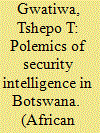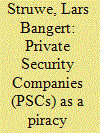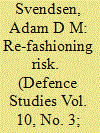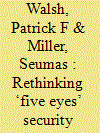|
|
|
Sort Order |
|
|
|
Items / Page
|
|
|
|
|
|
|
| Srl | Item |
| 1 |
ID:
132887


|
|
|
|
|
| Publication |
2014.
|
| Summary/Abstract |
This introductory article discusses some of the main themes that are contained within this collection originally delivered as papers to two conferences. There is brief consideration of some issues of method and major themes relating to the legacy of authoritarian regimes, the process of change and the current state of 'democracy' are identified. Continuing controversies and uncertainties around intelligence have important implications for democratic governance in many countries which must encourage more comparative work in this key area of intelligence studies.
|
|
|
|
|
|
|
|
|
|
|
|
|
|
|
|
| 2 |
ID:
137192


|
|
|
|
|
| Summary/Abstract |
This article discusses the validity of national security threats in Botswana and whether they justified the creation of the Directorate of Intelligence and Security Services (DISS), which has been controversial since its formation. Since its inception in 2008, the DISS has been accused of many human rights violations and politicisation. Without fully deliberating on the basis for its creation, some discourses have focused on the politicised operations without relation to what the DISS is supposed to be doing. The author works under the assumption that debates should be shaped by whether it was necessary to create the DISS, and, if so, how we can shape and steer debates on its oversight, management, reform and operations. This article argues that despite the politicisation of the DISS, Botswana's national security threats are both real and imagined; and that domestic threats to national security have moved from the conceptual ‘imagined’ category to the ‘real’. However, that in itself did not warrant the design and mandate of the DISS, and the article argues that it was external threats that really warranted the creation of a civilian intelligence agency. The article concludes that Botswana faces a plethora of external security threats – traditional and non-traditional – that warranted the creation and continuance of the DISS.
|
|
|
|
|
|
|
|
|
|
|
|
|
|
|
|
| 3 |
ID:
113403


|
|
|
|
|
| Publication |
2012.
|
| Summary/Abstract |
Today, the idea of risk is ubiquitous, a presence in debates across a range of fields, from investment banking to politics, from anthropology and sociology to health, environmental and cultural studies. While this ubiquity attests to the importance of the concept it is at the same time a potential weakness in that it injects the term into a wide range of debates in each of which its meaning can be subject to different emphases and meanings. The notion of risk is of obvious importance to security intelligence, but here too its ubiquity has had an impact on specificity of meaning. While the term is widely used in both the profession and study of intelligence, its usage can carry different meanings and it can be used interchangeably with linked terms. Given the importance of the idea of risk to intelligence, clarity of meaning is essential. This article sets out to consider the meaning of, and relationship between, uncertainty and risk in a security intelligence context, propose a framework on which a common understanding can be built, and illustrate how this can help in thinking about the nature and role of security intelligence.
|
|
|
|
|
|
|
|
|
|
|
|
|
|
|
|
| 4 |
ID:
114837


|
|
|
|
|
| Publication |
2012.
|
| Summary/Abstract |
Private Security Companies (PSC) are a part of the Best Management Practice in the shipping industry. The ship owners are using PSCs to protect their vessels against pirates, but protection of the vessels is just a part of the services that PSCs can provide. The services can be divided in four main groups: (1) security intelligence, risk assessment and consulting; (2) security services; (3) crisis response; and (4) intervention. While the use of PSCs may offer some deterrent value, the potential costs of hiring these firms would appear to outweigh the benefits. The argument in this article is that the use of PSCs works for the individual ship owners, but it is not a long term solution of the piracy problem unless they are used in a coordinated way by ship owners and the international society. In this way they can become an added value in the fight against piracy.
|
|
|
|
|
|
|
|
|
|
|
|
|
|
|
|
| 5 |
ID:
099508


|
|
|
|
|
| Publication |
2010.
|
| Summary/Abstract |
his article explores the recent UK, US and Canadian security and intelligence efforts against terrorism. Contrasts can be readily drawn. Essentially the UK is engaged in both internal/domestic and external/international 'firefighting' against terrorism. Therefore, it has adopted a wide-ranging 'broad risk management' approach. Meanwhile the US is engaged mostly in external/international 'firefighting' against terrorism, conceived of as counter-insurgency in countries such as Iraq and Afghanistan. Washington has adopted a narrower 'risk prevention' approach. The Canadians, confronting a smaller threat, are less embroiled in 'firefighting' activities, enabling them to adopt more of a 'risk pre-emption' approach involving some social engineering. Arguably, the Canadian model outlined in this article can offer some instructive lessons for both the US and the UK.
|
|
|
|
|
|
|
|
|
|
|
|
|
|
|
|
| 6 |
ID:
143763


|
|
|
|
|
| Summary/Abstract |
The Edward Snowden leaks challenge policy makers and the public's understanding and perspectives on the role of security intelligence in liberal democratic states. This article explores the challenges confronting security intelligence collection by the ‘Five Eyes’ countries – particularly those most affected by the leaks. We argue that the debate now needs to move beyond simplistic notions of privacy vs. security to a more detailed understanding of the policy and ethical dilemmas confronting policy makers and intelligence agencies. To that end, we provide a schematic framework (methods, context and target) to promote a better understanding of the practical, policy and ethical problems for security intelligence collection emerging post Snowden. The framework is a first step in identifying common principles that could be used develop an ethically informed set of policy guidelines to help decision makers better navigate between citizen's two basic rights: security and privacy.
|
|
|
|
|
|
|
|
|
|
|
|
|
|
|
|
|
|
|
|
|